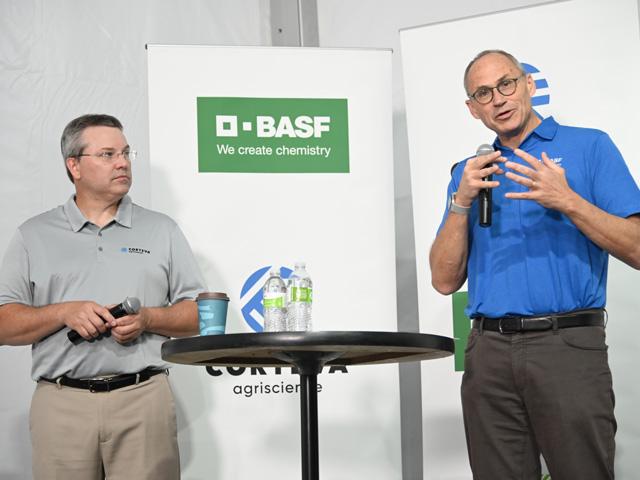Corteva-BASF Create Innovation Partnership
Corteva, BASF Join Forces for Soybean Innovation
BOONE, Iowa (DTN) -- Two agribusiness giants recently announced a partnership to develop future herbicide-tolerant soybeans and complementing herbicides for North American farmers, which includes a weed killer with a new mode of action.
Corteva Agriscience and BASF Agricultural Solutions held a joint press conference on Aug. 30 at a farm show in Boone, Iowa, to unveil a joint agreement to bring a new four-way soybean trait stack to market in the early 2030s. Soybeans will tolerate over-the-top herbicide applications of BASF's Liberty (glufosinate ammonium), Corteva's Enlist (2,4-D Choline with Colex-D technology), various glyphosate products and BASF's existing and pipeline PPO (protoporphyrinogen oxidase) inhibitors, which include Kixor, Tirexor and a new PPO-inhibitor under development.
Leaders from both companies said a five-way soybean trait stack is also being developed. Soybeans would tolerate Liberty, Enlist, glyphosate and several PPO inhibiting herbicides and a herbicide with a brand new mode of action (details weren't provided). A release date is slated for some time in 2040.
Peter Eckes, BASF president of R&D and regulatory, described the joint venture as an "industry-first collaboration" that will benefit farmers for decades to come by providing new tools to fight herbicide-resistant weeds.
"I think the unique part is that it's a long-term agreement that we have caring about farmers, and they will have additional choices in weed control," he said. "I think what our companies are truly dedicated and committed to is providing growers with new options not only today and tomorrow, but also in the long term."
P[L1] D[0x0] M[300x250] OOP[F] ADUNIT[] T[]
Sam Eathington, Corteva executive vice president and chief technology and digital officer, recalled long days of pulling and chopping weeds in soybean fields on the western Illinois farm where he grew up. For a while, walking soybeans (except in organic acres) all but disappeared with the advent of herbicide-tolerant soybeans.
Walking soybeans has again become more common due to growing problems with herbicide-resistant weeds, particularly waterhemp and Palmer amaranth. Eathington hopes new technology and chemistries from Corteva and BASF can reverse that troublesome trend of more hand weeding.
"What's really special about this (partnership) is we're giving farmers additional management opportunities, different ways to control weeds," he continued. "What we're doing is bringing together four unique modes of action on our Enlist platform and BASF's proprietary gene for PPO and some of the herbicides they're bringing. And we're doing it in lots of different (soybean) germplasm."
In a cross-licensing agreement, BASF will license its proprietary PPO gene for herbicide tolerance to Corteva to develop a new four-way, herbicide-tolerant trait stack. It will be available in all Corteva seed brands. Corteva has licensed the stack for use in BASF seed brands.
Both companies plan to offer exclusive and proprietary germplasm options with the stack, enabling farmers to work with their preferred seed supplier and route to market. Corteva anticipates licensing the new trait stack to independent seed companies in North America.
Eckes recently visited a BASF research station in Iowa where soybeans with the new four-way trait stack are being grown. "What I saw was absolutely fantastic; it was amazing. Clean fields," he boasted.
But development and the regulatory process of new traits and technology takes time, Eathington said. That's why the four-way and five-way herbicide-tolerant trait stacks won't be available for release for another decade or two, respectively.
"We still need to do some additional field testing and technical evaluation as we breed with different elite germplasm," Eathington added. "We're in the regulatory process to make sure the seed can be shipped around the world. Technology actually moves a little faster than regulatory usually."
This isn't the first time BASF and Corteva have worked together. The companies recently announced a partnership to develop Enlist E3 soybeans with the nematode resistant soybean (NRS) trait. Read about that at https://www.dtnpf.com/….
Matthew Wilde can be reached at matt.wilde@dtn.com
Follow him on Twitter @progressivwilde
(c) Copyright 2022 DTN, LLC. All rights reserved.






